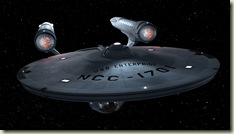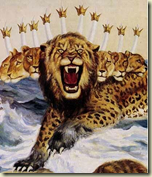Recently when asked by fans if he would like to become Canada's Governor General (chief of state, but more of an honourary figurehead), William Shatner turned them down saying that rather than a ceremonial role he would want to be Prime Minister of Canada, an active role in which he could "lead Canada into even greater exploits."
Just as Arnold Schwarzenegger could do well as California Governor, and wanting to improve on the Global National piece above, I believe a case can be made for William Shatner, or better yet Captain Kirk, to be the next great Canadian Prime Minister.
- Star Trek and Captain Kirk (aka William Shatner) present us with a better, ideal future—where technology solves all problems, there is full equality and no racism. There's no more poverty, no more war and no global financial crisis—they don't even use money anymore! Star Trek has always been about "boldly going where no one has gone before." That's the kind of leadership we need in a Prime Minister.
- No matter what the challenge, Captain Kirk always came up with a plan that prevailed so that every episode of Star Trek could end with the Enterprise and her crew ready to fly to their next mission. Faced with the worst case scenario, the Captain questions himself, "What have I done?" And Dr. McCoy encourages him saying, "What you had to do, what you always do. Turn death into a fighting chance to live."

- The starships, aliens and phasers are really cool, but Captain Kirk always focused on the human drama (or human-alien drama). He excelled as a Captain not because of the Enterprise's incredible phaser power and photon torpedoes, but because he knew how to get inside his opponent's head and win (think "The Corbomite Maneuver").
Regular readers of my blog are probably wondering, What in the universe is this all about? Isn't Ken's blog about the Bible, interpretation and contemporary issues facing Christians? For you, here's a more suitable title for this posting:
Everything I Ever Needed to Know about Revelation (and apocalyptic writings),
I Learned from Captain Kirk and Star Trek
 And, yes, I am serious. The church has been plagued with the most strange, alien and bizarre interpretations of the book of Revelation (as well as the other Biblical apocalyptic writings). We need a new and better way of understanding Apocalyptic writing.
And, yes, I am serious. The church has been plagued with the most strange, alien and bizarre interpretations of the book of Revelation (as well as the other Biblical apocalyptic writings). We need a new and better way of understanding Apocalyptic writing.
We don't write apocalypses in 2009; it's not a genre used today, but science fiction is everywhere around us, on TV (Fringe), in movies (new Star Trek movie coming soon!) and in novels (Twilight). We would have a much better chance of rightly understanding biblical apocalyptic writings like Revelation if we think of them as being like science fiction. No Trekkie expects to get in a fight with a Klingon tomorrow, but to learn something about honour and loyalty—well, this is quite possible. Reading Revelation like we read science fiction is far more respectful and insightful than reading it like the authors of the popular Left Behind novels who see it more as a Farmer's Almanac or horoscope which can be used to scare people into believing.
My three points above promoting Captain Kirk for Prime Minister are actually about how Star Trek can help us to understand Biblical apocalyptic writings like Revelation.
- Apocalyptic writings like Revelation give us a vision of a perfect future, but present no hope for us to get there apart from the incredible intervention of "the Son of Man." The writings assure us this future will come in spite of present circumstances.
- Revelation does comfort us in the present crisis we find ourselves in. It sometimes shows despair about anything getting better in our world, but still it constantly affirms that God is in control and despite appearances, his plan is in motion. God will bring about future victory through our present defeats, just as Jesus Christ prevailed through dying on the cross. The resurrection turned death into a chance to live, and to live life to the full!

- Symbols, wild imagery and fixation on special numbers are found throughout apocalyptic writings (the Beast, ten horns and seven heads, 666), but the focus should be on the human drama and how Christ, the Son of Man, is leading us. Ignoring this Christ-centered focus, many have come up with the strangest ideas of what Revelation is all about. Personal recommendation: don't get so caught up in the symbols, imagery and number that you lose sight of Jesus!
As it turns out, both Revelation and science fiction may seem to be describing the future, but they both have a lot to say about the present. They both offer quite a critical social commentary on how we live today, on how we treat others and on how much we need to change. To conclude, the following video shows three scenes from three eras of Star Trek. Each clip is followed by a verse from Revelation showing how both have much the same message and graphic method of presentation.
The pictures and video clips used here are being used solely for academic purposes and no profit of any sort is being derived. Credits as follows:
1. Star Trek: The Original Series, "Let That Be Your Last Battlefield" (CBS/Paramount Television)
1b. picture of Star Trek creator Gene Roddenberry and most of the cast of the original series of Star Trek at the dedication ceremony of the test Shuttle Enterprise (renamed due to a massive letter writing campaign by Trekkies)
2. Star Trek IV: The Voyage Home (CBS/Paramount Pictures)
3. Star Trek: Phase II, "Blood and Fire, Part 1" (James Cawley Productions) You've really got to check this out! It's an all new web-based Star Trek, continuing The Original Series, year 4 of the 5 year mission: Star Trek: Phase II. They've even had Original Series stars like Walter Koenig (Chekov) and George Takei (Sulu) included in their production. "Blood and Fire" is the fourth episode and the first teaser for this episode said that it was dedicated to "all the men, women and children who have died of AIDS because of the silence, the inaction, the cowardice and the hypocrisy of those few who had the opportunity to speak up and make a difference—and did not. " That, in my opinion, is classic Roddenberry Star Trek.
3b. picture from Star Trek: Generations (CBS/Paramount Pictures)



Finally, someone else who reads Revelation the way I do and I’m sure is the way it was intended to be read.
ReplyDeleteScience fiction writers like H.G. Wells, Jules Verne, Arthur C. Clarke and others are inspired by what they see in the world around them. They learn all they can about their subject and they invent a suitable vehicle to convey their speculation about what would happen if a particular trend were to continue, for instance.
Revelation whether inspired by God or simply by the writer’s knowledge or the world situation at the time shares that same genre.
Here we are talking about good speculative fiction like Star Trek, Stargate and some sci-fi novels not the like of Star Wars and the Terminator space cowboy types. Actually most of what is called science fiction is enough to make anyone resist the idea of Revelation being a form of science fiction.
Reading Revelation as a comment of the situation in the world at the time and what it could be leading to instead of a prediction of things to come makes it more applicable to any period in history and has a better chance of arming us against the “beast” which is always prowling about. Nowadays greed and consumerism may well qualify as would certain leaders at various times in history. Yet we should never be stuck with any one “beast”, they come and they go.
I like the white/black vs. black/white episode that uses gross exageration to point out the illogic and evil of discrimination on the basis of outward appearance. I think there are many instances of that sort of thing in Revelation and we should look more for what it has to say about conditions in the world today and how we should deal with them than what it could possibly be saying about the future.
Is Revelations a book of hope? The end of an age in which Satan's "rule" is destroyed? Then that sounds like the world of Star Trek, at least the Original Series, anyway. As Ken points out, the world of Star Trek is an optimistic view of man's future. There is a universe to explore because wars are obsolete -- there is a federation of all people and it is multiculturalism at its best -- IDIC as Spock would suggest -- infinite diversity in infinite combinations. Money is still around, but it is in the form of "Federation Credits" a mere convenience, not the be all and end all of existence.
ReplyDeleteEpisode after episode offered a moral teaching – prejudice is bad, it is not always easy to distinguish between the good guys and bad guys, beauty is relative, keep your phasers on stun, (that’s American for ‘turn the other cheek’) and if you encounter sun worshippers out there, they might just turn out to be Son worshippers.
It makes sense to read Revelations like science fiction. Both are richly filled with imagery – sometimes a bit weird and difficult to interpret but always thought provoking and a bit of a mystery and that is what it is all about.
Lou & Peter,
ReplyDeleteThanks for your comments. We are witnesses for Christ in a world gone wrong. Revelation understands the challenge of living for Christ in a world opposed to him and offers us hope, strength and courage. It tells us about a better future and encourages us to approximate that future the best that we can right now.
The trouble is that most people read Revelation and think it is some kind of horoscope of things to come. They think this because they consider Revelation to be a book of prophecy and they understand prophecy to be future forecasting. Thus, they are waiting to hear the hoofbeats of four approaching horsemen of the Apocalypse which will signal the beginning of all that is to come.
BUT that's not really what prophetic writing is about in the Bible, there's more forthtelling than foretelling. BUT Revelation is a special kind of prophetic writing, it is apocalyptic. And apocalyptic writing is more like the science fiction of Star Trek than any other literary style we use today. So the horses of Revelation are allusions to the horses that were patrolling the land at the time of Zechariah. They are active in the world. I'd say they've run rough-shod over the earth we find ourselves living in today.
Is there not enough conquerring, war violence, economic disparity, famine, plague and wild animal attacks in the world to affirm that the four horseman are galloping about?
Ahhh, but you haven't seen a white horse and its rider armed with a bow. Nor have you seen a red horse whose rider is armed with a large sword, so therefore you conclude it hasn't happened yet. This is exactly why I recommend trying to re-read Revelation as Trek-style science fiction. Like a true Trekker, don't get hung up on the Klingons, phasers and starships (or four horseman in this case), look for the message behind the symbols. That is a winning reading strategy for Revelation.
Thanks again, guys. I'm glad that at least you two don't think I'm crazy.
Ken